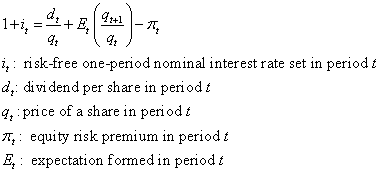"Negative interest rates, Sharia law and tech stocks
May 20, 2009 9:57am
Morality
I know of ethical systems that hold all interest to be sinful. Riba, interest on money, is forbidden by the Quran. I don’t know what Sharia scholars would have to say about negative nominal interest rates. If if were viewed as a gift from the lender to the borrower it might even be condoned. Perhaps an extra-credit question on the next Islamic finance examination? Medieval Christianity also banned ‘usury’, which meant any ‘interest’ rather than outrageous interest rates - its modern meaning.
Interest is viewed by some as immoral because it represents an increase in capital without any services being provided. I don’t share the sense of moral outrage at interest per se, but I can understand where it comes from - something for nothing ain’t right. However, I know of no ethical system that attaches opprobrium to an intertemporal relative price that is greater than unity but not to an intertemporal relative price that is less than unity - or vice versa.
Apparently, there are those who believe that when the price today of one unit of money tomorrow is less than one unit of money now - when the nominal interest rate is positive - there is no moral issue. When the price today of one unit of money tomorrow is more than one unit of money now - when the nominal interest rate is negative - something nasty is being perpetrated. No matter how I shake and bake this set of beliefs, I cannot make sense of it.
Equity, high tech or other
Would the temptation/urge to escape into equity (high-tech, low-tech or no-tech) should the short nominal rate of interest become negative would make a negative nominal interest rate policy infeasible? Obviously not. Below I have scribbled the standard portfolio balance or equilibrium condition that must be satisfied if an investor is will to hold both short nominal bonds with a nominal interest rate i and equity with a dividend per share d, a current share price q, an expected future share price Eq and an equity risk premium π . The risk premium can be given economic content (I won’t bother with that here). It is not whatever is required to make the relationship hold identically.
What this means is that (holding the equity risk premium constant for the sake of argument), a negative nominal interest rate, for a given positive dividend yield, requires the expectation of falling equity prices. This is less counter-intuitive if you replace ‘falling equity prices’ by ‘high but falling equity prices’. So negative nominal interest rates and tech stocks can coexist peacefully. The price today of one dollar of money tomorrow can be a dollar and five cents, that is, i = -0.05. Most economics I know breaks down only if the price today of one dollar of money tomorrow,
, were to become infinite or to become negative (i goes to -1 from above). This would mean a nominal interest rate of minus 100 percent or more. It would be a strange world if you put 1 dollar in a deposit account and after a year got back nothing or a demand for payment. But there is nothing at all strange about a world in which you put a dollar in a deposit account and get back 95 cents after a year. With a bit of luck, we may even get used to having such a state of affairs prevail from time to time."
Me:Since I've studied the Talmud on some of these issues, I'm going to leave the religious question aside. However, via Zero Hedge, I came upon the following excellent post that gives a version of the ideas I agree with:
http://www.american.com/archive/2009/may-2009/why-not-negative-interest-rates/article_print
"Would anybody rationally pay $1.02 for $1.00 in cash? They do today, if they take cash as a non-customer from an ATM. The average ATM surcharge fee is about $2. For a $100 withdrawal, that is equivalent to a price of $1.02. Alternately thought of, if a $200 withdrawal were cash for one month, the average fee would be equivalent to a negative 12% interest rate.
In general, the increasing dependence on electronic payments makes a massive move to currency less feasible and thus negative interest rates more plausible."
Read the whole post. And, of course, there's this, via Hugo, wherever he is:
http://www.chiemgauer.info/
I have to say, the idea that you would place a disincentive on flight to quality panic buying makes perfect sense to me. Since it is, in some sense, equivalent to inflation, I can only guess that people would rather not notice that their assets have been devalued. Calling Erich Fromm!







































No comments:
Post a Comment